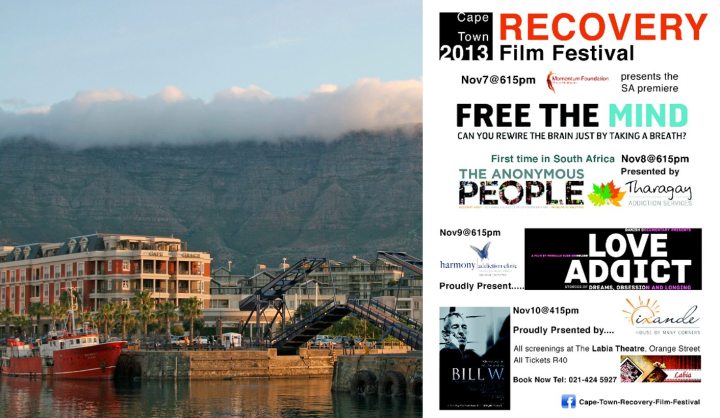Maverick Life
Anonymous people no more: Cape Town Recovery Film Festival

Addiction is arguably one of the Western Cape’s most serious problems, and instead of getting better, it’s getting worse. Is education the answer? Dougie Dudgeon, organiser of the brand-new Cape Town Recovery Film Festival, thinks it is. He spoke to MARELISE VAN DER MERWE.
Cape Town has a new film festival kicking off this week, and its aim is to start people talking about one of the province’s most endemic problems – addiction.
The Cape Town Recovery Film Festival (CTRFF), organised by former Londoner and local addictions counsellor Dougie Dudgeon, will kick off at Cape Town’s Labia on Orange on Thursday 7 November and will run for four days until 10 November. (“We love the Labia even though they’re a bit scruffy,” quips Dudgeon.)
Dudgeon, who has been in recovery for six years, was in active addiction for thirty years before recovering with the help of a GP, a psychiatrist, two psychologists, and a team of five experienced counsellors, the latter being recovering addicts themselves. He believes wholeheartedly that the voices of addicts need to be heard far more powerfully in the narrative of addiction – in addition to the voices of “experts” such as psychologists and psychiatrists who, although highly qualified academically, do not always have the life experience to go alongside.
“I count myself extremely lucky to have had the team that I had, and I put my recovery down to having people on the team who had experienced addiction,” he explains. “With no disrespect to the professionals, I believe it is extremely important to give a voice back to the people in recovery… There are clinics where there is almost no input from people in recovery, but I believe you need that.”
With this in mind, Dudgeon says, he felt it was imperative to raise the issue of addiction locally, through a series of thought-provoking documentaries that would also educate people. For him, the catalyst for putting the festival together was watching the film The Anonymous People, a documentary about the more than 23 million Americans living in recovery.
“It was the catalyst, largely because it talks about the history of the recovery Movement, capital M, in the US,” he says. “It’s a movement that is growing all over the world – people are gaining this knowledge – and people in recovery are beginning to express their thoughts and beliefs more and more, rather than just leaving the telling in the hands of the experts. There is no reason why that should not also be happening here. In terms of reach, don’t we need this essential information? I am hoping that this film can start that much-needed debate.”
For Dudgeon, the approach to addiction needs to change, and drastically. “The Western Cape government, with the best intentions, is looking for ‘the right way’ to combat addiction,” he says. “But there are as many paths to recovery as there are people. However, because of the lack of voices speaking out about it, people don’t know of the possibilities – they feel hopeless. We are in desperate need of a conversation in South Africa that will educate people.”
Dudgeon is not wrong. The generally accepted statistical average is that ten percent of any given population is prone to addiction; South Africa’s drug problem is, however, estimated to be as much as twice the world norm, with the United Nations World Drug Report fingering marijuana and tik as particularly bad problems in 2009; since then, however, it is safe to assume that one needs new data on drugs such as nyaope, which is the rising star in townships. According to SAPS figures published by TNT in 2012, 60 percent of crimes nationally are related to substance abuse and 65% of murders are related to alcohol.
Over the past decade, South Africa has seen an explosion of drug trafficking. Many of the country’s ports are a major shipping hub for cocaine smugglers, with the number of people seeking help for cocaine abuse increasing by almost seventeenfold in the space of just over a decade, culminating in a whopping 290,000 cocaine users in 2008. The use of heroin in South Africa, meanwhile, doubled in 2012. Drug abuse costs the economy R20 billion each year.
Alcohol is no less of a problem. The Central Drug Authority (CDA) estimates that there are around two million people in SA that can be classified as ‘problem drinkers’ and 7,000 people die per year from drunk driving. As a country we have one of the highest rates of Foetal Alcohol Syndrome worldwide (with some studies rating us as the very highest) and the Western Cape Health Department estimates that 130 people die each day from causes related to alcohol. (Interestingly, AfricaCheck also points out that we have an unusually high number of lifetime abstainers in South Africa.)
Scared yet? You should be. South African Medical Research Council chief specialist scientist in their alcohol and drug abuse unit, Bronwyn Meyers, recently stated that 5.7 million South Africans would suffer from an addiction disorder in their lifetime. Furthermore, statistically, it is widely accepted that an active addict will have a negative impact on at least sixteen people. That means, in terms of sheer numbers, addiction is likely to touch you and me and everyone we know at some time in our lives.
Furthermore, addiction drives the country’s staggeringly high rate of absenteeism in the workplace (research has shown that absenteeism is three times higher amongst employees with drug or alcohol problems) – which currently costs the economy R19 billion per year and can be as high as 18% per given day in some companies or 33% if you work in government – and is concerningly prevalent amongst many of society’s most important sectors, such as education and policing.
“Anecdotally, I can tell you that there is an extraordinarily large number of people from all walks of life in treatment, including teachers, police, doctors, nurses and city workers,” says Dudgeon. “Drugs and alcohol are breaking down every part of our society. They stifle families, growth, and healthy debate.
“It affects everybody,” says Dudgeon. “Yet it is still a disease that so many people don’t perceive as a real disease. When I went into recovery, I was told that I had about 18 months to live if I carried on the way I was. I would have died from that disease.
“If you look at something like breast cancer, people wear pink ribbons, and they get together in their thousands, and they march, or run, or raise funds – which is brilliant, and the way it should be. But I can’t help thinking that if people did that for addiction, you’d probably find police cars at the start, arresting people.”
For Dudgeon, the lack of knowledge is the crucial problem driving the local addiction problem. “The only way we can combat this is through education,” he says. “It does not help to put addicts in prison. In the US, some 80% of prisoners are first- and second-time drug offenders. You are locking up people who are sick. It is a health issue first! Calling it a crime is not solving the problem.”
Furthermore, he adds, there is a fundamental problem in the way that treatment is being approached. “It is a chronic illness, but we treat it as though it is acute,” he says. “In The Anonymous People one woman recovers from both addiction and cancer, and explains that the difference is that after cancer, she had follow-up treatment and checkups, whilst with addiction she got a badge after 28 days and was sent out on her own and told it was her responsibility not to relapse.”
This lack of support is mirrored in the chilling picture Dudgeon paints of the treatment of the average South African policeman in private care. “Medical aids pay for 21 days of treatment,” he says. “That’s it. For most addicts, that’s just enough time to remain in denial. Then after 21 days, if you’re a policeman, you get a tick next to your name and you get your gun back. There’s no follow-up, but you’re given a gun.”
So much for the context. What of the festival, then? The primary purpose, says Dudgeon, is “to start the debate”. Although the festival is kicking off at the Labia, the aim is to move it through the Cape and expose as many people as possible to it at grassroots level, especially in areas where addiction is most prevalent.
“We are in discussion with people in Hout Bay, as well as with a well-known addiction counsellor and recovery advocate in the Cape Flats, and we are negotiating for the rights to go on tour and screen the films further afield,” says Dudgeon.
The key feature is the abovementioned The Anonymous People, which was made with the help of crowd-funding programme Kickstarter; it zooms in on the stories of various people in recovery. It particularly aims to break the stereotype that addicts somehow look different to everyone else – “it shows people looking normal,” says Dudgeon, who believes that denial would be less of a problem if people were not led to believe that alcoholics “looked like berghies” and drug addicts “looked like junkies with needles”. “We need to move beyond that picture,” he says. “Anonymous People helps to do that.”
Then there’s Love Addict, made by award-winner Pernille Rose Grønkjær, which The Guardian succinctly described as “not all fluffy kittens and dreamy nights”. It follows the stories of seven self-confessed love addicts and attracted some controversy when one of the participants later posted a rather scathing review in which she denigrated both the filmmaker and other participants for being out of control of their lives – seemingly without much consciousness of pots and kettles. The film nonetheless fared better with reviewers from New York Magazine and Variety.
Bill W is the fascinating life story of Bill Wilson, the founder of Alcoholics Anonymous in 1935. Today, there are over 50 different groups that use the 12-step philosophy or use “Anonymous” in their group names – and they operate in over 160 countries. Time magazine listed Wilson as”Bill W.: The Healer” in the Time 100: The Most Important People of the Century, and Friar Richard Rohr described the 12-step programme as “America’s most significant and authentic contribution to the history of spirituality”. The film makes use of rare original footage including home movies, old interviews and conferences, and got high ratings on both Rotten Tomatoes (82 – 100% at various stages) and Metacritic (78).
Then there are two films focusing on the theme of mindfulness, which is central to recovery from both addiction and trauma: Free the Mind and Addiction, Yoga and Recovery, both of which are documentaries. The former focuses on the work of Professor Richard Davidson from the University of Wisconsin, who specialises in – among other things – PTSD; the latter is made by Lindsay Clennell, who used to make video promos for The Stranglers and other prominent rock acts in the 70s and 80s before going into recovery through yoga. From there, he began using his production skills to film the recovery stories of other people he met, and collated them into a film.
The festival, says Dudgeon, is intended to run annually, and he hopes it will eventually play a significant role in the education of South Africans on the drug epidemic.
“What we aim to do is start the conversation,” he says. “I don’t claim to have all the answers, but I love asking the questions.” DM
Follow the CTRFF on Facebook.

















 Become an Insider
Become an Insider